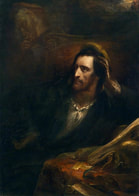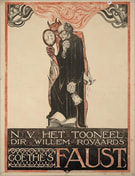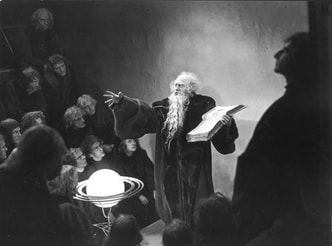WHY FAUST?
Who was Faust?
|
Good question. The mysterious legend is probably based on alchemist and magician Dr Johann Georg Faust, who lived in Württemberg, Germany around 1480-1540. He had a degree in divinity but seems to have been more of a travelling mystic, selling dubious cures to earn a living. Something out of the ordinary must have happened and in 1587 an anonymous book appeared called Historia von D. Johann Fausten. It tells the story of a scholar who was frustrated with the limitations of his life, and made a deal with the devil. He signed a contract whereby he would have every desire for pleasure and knowledge satisfied for a period of 24 years, after which his soul would receive eternal damnation. The book tells the tales of his adventures, and would have been scandalous and dangerously appealing in the religious age in which it first appeared.
|
How was the story of Faust handed down to us today?
It seems to have had a life of its own. Almost immediately there were several versions produced by other authors, each using their imaginations to add their to Faust's adventures. The legend reached England and a translation was published in 1592. This was used by Christopher Marlowe, Shakespeare's most successful contemporary, as a basis for his play The Tragical History of Doctor Faustus which is still performed today. But it was the German author Goethe who ensured the long-term survival of the legend by creating his masterpiece Faust, written throughout his life and eventually finished shortly before his death in 1832.
Why was Goethe's 'Faust' so influential?
|
Goethe's contribution to the Faust legend was to transform a medieval story into a parable for the modern, predominantly secular age. Although he read the original Historia with its black-and-white certainties, Goethe chose to rewrite the character of Faust into a more ambiguous modern person - deeply flawed but who does his best to explore the world and make the most of his life without divine help. Although there is a character called Mephistopheles, loosely related to the devil of the medieval version, it is clear that Faust doesn't believe in his powers. One way to understand Goethe's vast text is as an exploration of what it means to be a moral individual in a post-religious age, which makes it as relevant today as it was during the 19th century.
|
What does Faust have to do with music?
|
Goethe was one of the most influential writers of his time, and his Faust proved irresistible to artists and composers. Beethoven, Berlioz, Schubert, Schumann, Liszt, Wagner, Mahler, and Stravinsky all wrote works on a Faust theme, to name just a few. Goethe's focus on the inner life of the individual neatly coincided with the advent of Romanticism in classical music, concerned with conveying an individual's emotional states of being. This legacy still influences the way we listen to music today. So in a way, classical music does with notes and rhythms what Goethe's Faust did with words: it creates a mini-universe of meaning and beauty which can help us understand our experience of life as a whole. The perfect name for an orchestra...
|





